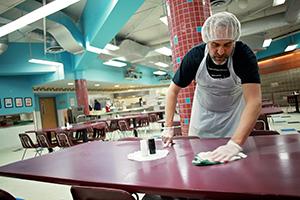Humble doctor unashamed of why he volunteers
Medical doctors are sometimes stereotyped as having egos larger than today’s health premiums.
Dr. Luther Philaya, a Salvation Army volunteer, does not fit that stereotype.
“God has taught me humility,” said Philaya, 58. “But I had to have it all taken away.”
“All” includes being stripped of his medical license and board certification. The former family doctor lost those things, and everything else in his life, to addiction. He now volunteers for The Salvation Army to satisfy the community service requirements of his probation.
Refreshingly, the modest doctor loves talking about his past and how it has made him a stronger person.
“After my relationship with God, my recovery is who I am,” said Philaya, who has been sober since Oct. 11, 2012, after a years-long addiction to prescription medications. “Why should I be ashamed of it?”
Thankfully, Philaya’s medical license and board certification have been reinstated. He now works in health informatics.
 His office is just a few blocks away from The Salvation Army Harbor Light Shelter in Minneapolis, where since early November he’s been serving hot breakfasts two mornings per week. He occasionally volunteers at the West 7th Salvation Army in St. Paul as well.
His office is just a few blocks away from The Salvation Army Harbor Light Shelter in Minneapolis, where since early November he’s been serving hot breakfasts two mornings per week. He occasionally volunteers at the West 7th Salvation Army in St. Paul as well.
Although he is required to volunteer, Philaya wants to continue helping The Salvation Army long after his community service hours have been satisfied.
“I love it – the people here are fantastic,” he said. “I had never volunteered before. For me, it’s an eye-opener with my addiction, realizing this affects everybody across all socioeconomic classes.”
Philaya admires the support systems in place for people at Harbor Light who are battling addiction. As a medical doctor who struggled with the disease, support was scarce.
“There are two things you don’t want to have as a doctor – addiction or mental illness,” he said. “You become ostracized. People don’t line up saying, ‘I hear you’re sick, I want to help.’ As my girlfriend says, there are no casseroles.”
And make no mistake: addiction is a sickness.
“A lot of people don’t understand that – they just say you don’t have willpower,” Philaya said. “Neurologically, if you look at the disease, you can do scans that show the rational part of the brain – the prefrontal cortex – shutting down. You only care about the drugs.”
He is quick to admit that he and others in recovery are at fault for popping their first pill, smoking their first hit, or drinking their first drink.
“That’s true,” he said. “But you don’t take it knowing you’ll become an addict.”
Looking ahead, Philaya is pondering the idea of someday going into addiction medicine. But right now, he’s taking his life one day at a time.
“I have to live my recovery – I still have obstacles to overcome,” he said.
 Meanwhile, he is happy to include volunteering for The Salvation Army as an enriching component to his recovery.
Meanwhile, he is happy to include volunteering for The Salvation Army as an enriching component to his recovery.
“I love interacting with the people,” Philaya said. “We’re all human beings. We all have our skeletons in the closet.”
Please join The Salvation Army by volunteering or making a donation to support your local community.
